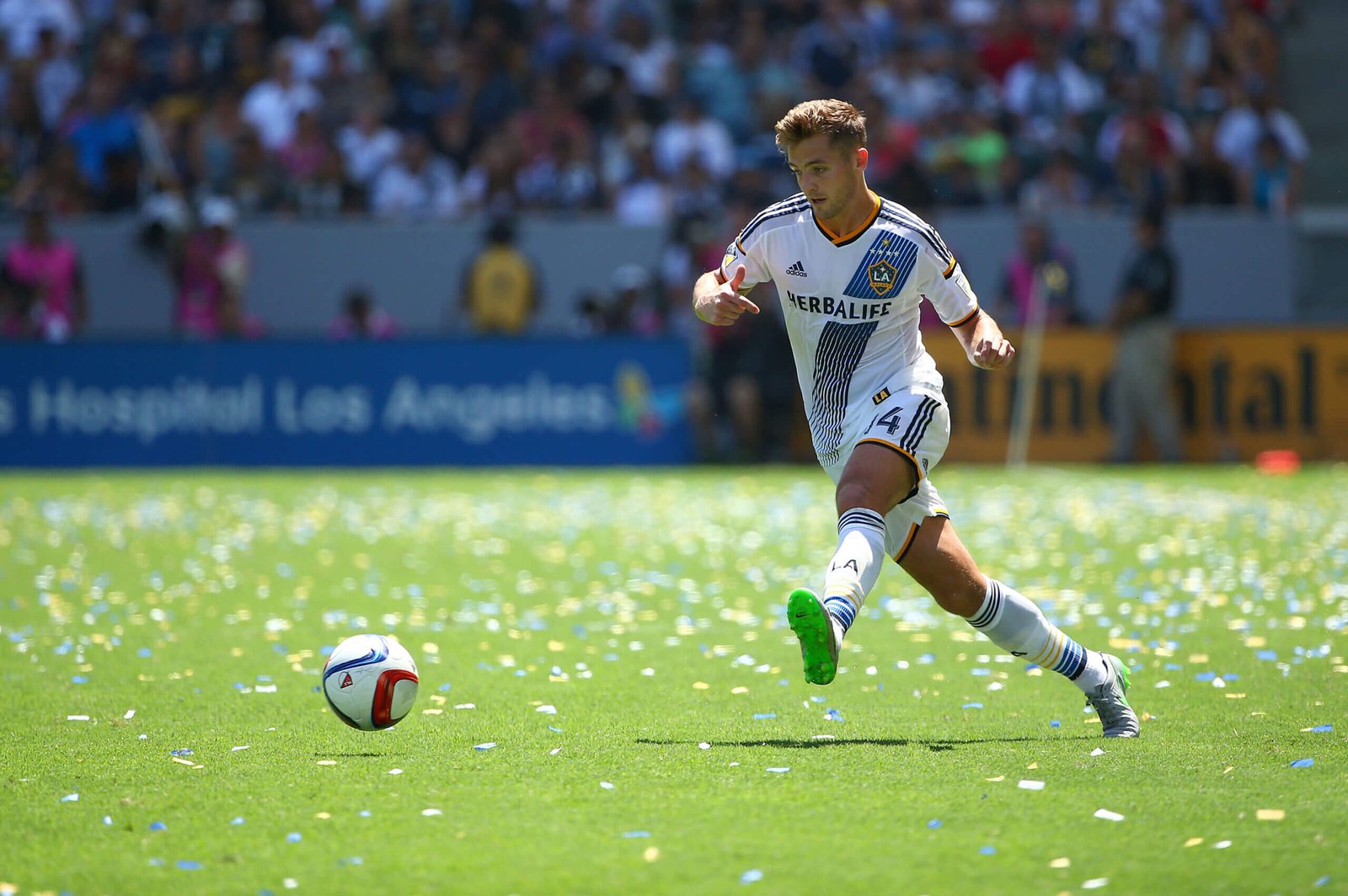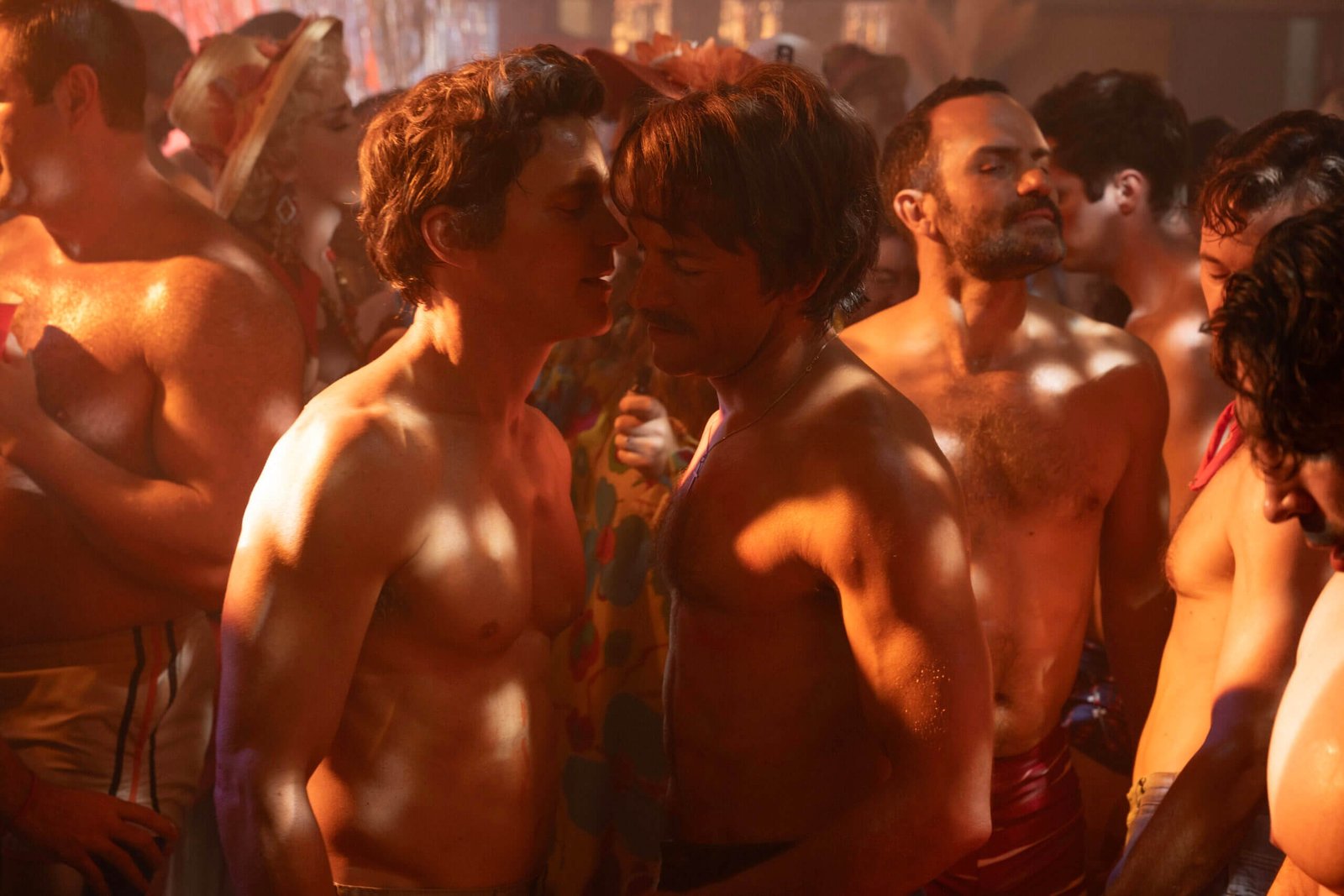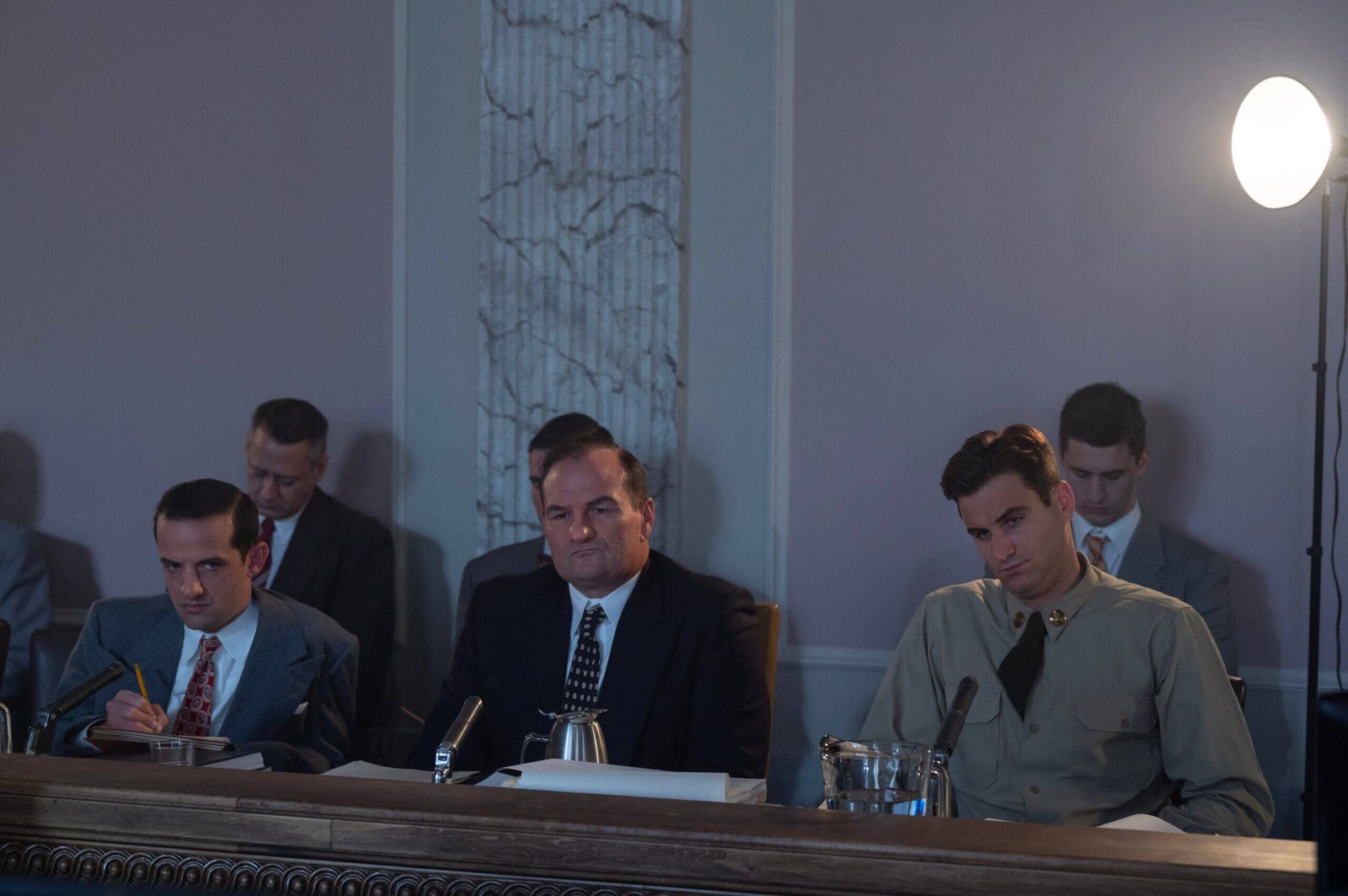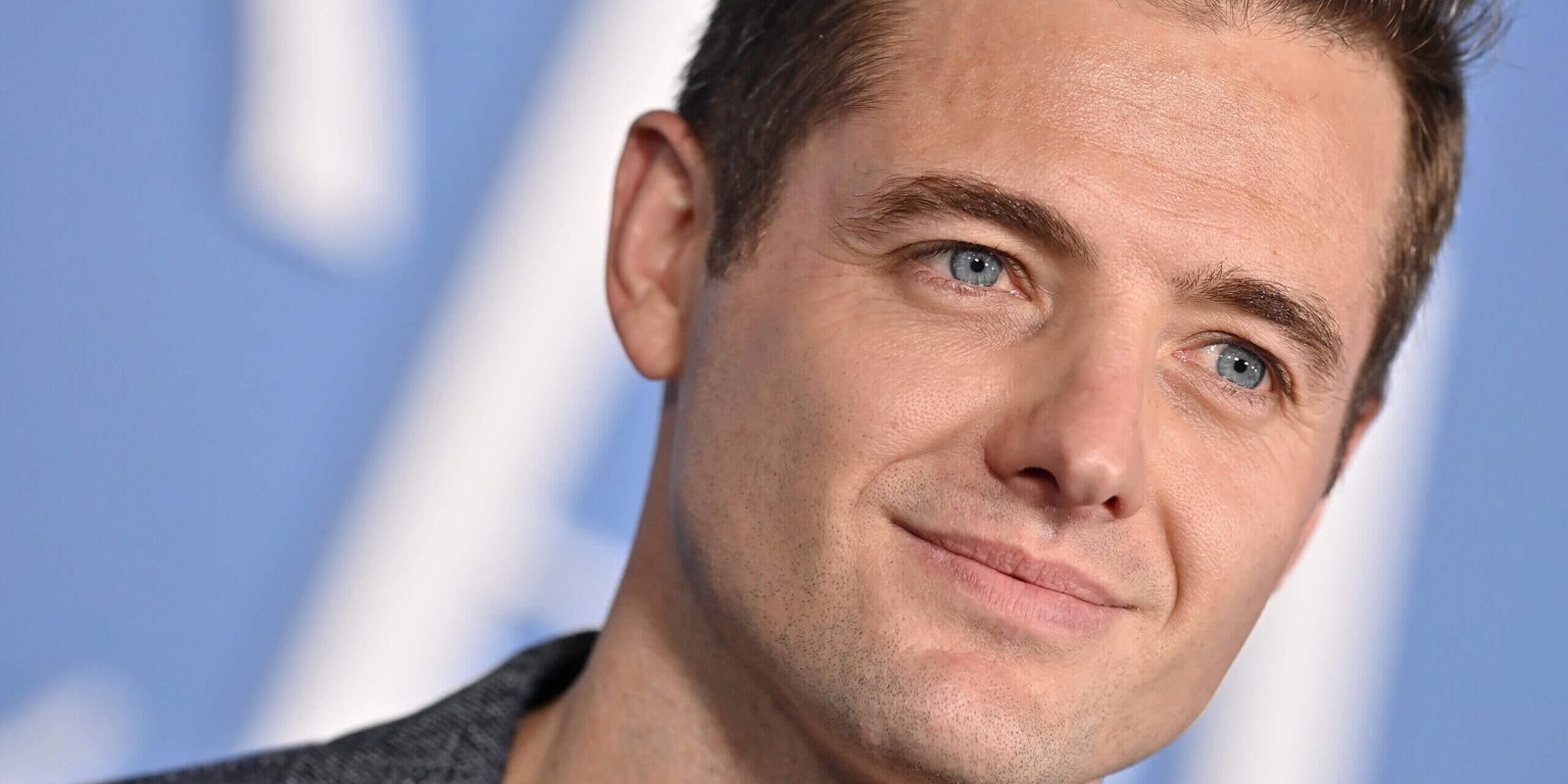Robbie Rogers walks down the red carpet at the Golden Globes, glances back, and sees his husband, one of America’s most prolific television producers, taking a photograph.
“Usually, I am his plus-one to these events in Los Angeles,” Rogers smiles. His husband is Greg Berlanti, known for his work on hit series including Dawson’s Creek, You, Everwood and Riverdale, as well as directing the 2018 teen gay-romance movie Love, Simon, which grossed more than $65million (£51m) worldwide. “Greg is creating all these shows and has changed LGBTQ content in such an incredible way. But this time, I was walking down the red carpet with the cast — and Greg is there, taking a picture of us. It is something incredibly special.”
This time around, Rogers was there for his own achievements, as an executive producer on Fellow Travelers, which premiered on Showtime and Paramount+ in October. It has since been nominated in the Best Television Limited Series category at the Golden Globes. The series has received critical acclaim for its retelling of a best-selling novel of the same name by Thomas Mallon.
Rogers attends the Fellow Travelers premiere (Tasos Katopodis/Getty Images for Paramount+ with SHOWTIME)
It is an eight-part TV production; a political drama and a gay love story rolled into one, which spans several decades in the second half of the 20th century. It takes in the U.S. government’s campaign against communists and “sexual deviants” and culminates amid the HIV/AIDS crisis in the 1980s. Plenty of people will know about McCarthyism, the Red Scare and the witch-hunts that expunged communists from U.S. institutions. Yet perhaps fewer will know about the Lavender Scare, and how gay people, in the name of “morality” and “national security”, were driven out of jobs and opportunities, or forced to lead agonising double lives to conceal their sexuality.
Rogers, of course, has made a name for himself before. He is the former USMNT soccer player and Olympian who, in February 2013, became the first openly gay male athlete in a major North American professional sport when he published a 408-word statement on his website. He wrote: “For the past 25 years I have been afraid, afraid to show whom I really was because of fear. Fear that judgment and rejection would hold me back from my dreams and aspirations. Fear that my loved ones would be farthest from me if they knew my secret. Fear that my secret would get in the way of my dreams.”
In men’s sport, he encountered so much casual homophobia, both growing up in the U.S. and as a player at clubs such as Leeds United in Europe, that he initially concluded that being gay was incompatible with a life in football. When he came out, he therefore retired. It is this feeling of jeopardy that he says connects him to the storylines he has told not only in Fellow Travelers but also as a producer of My Policeman (2022), which tells the story of a closeted policeman in the United Kingdom during the 1950s. Rogers’ own life in 2024 — married in L.A. and raising two children — is a lifetime away from such experiences. Yet in so many realms of men’s sport, that self-denial, stigma and suppression lingers.

Rogers in action for LA Galaxy (Victor Decolongon/Getty Images)
“I’ve always felt like an outsider,” Rogers says, in a Zoom interview. “In sports, for being a gay man. But I have also felt like an outsider in the gay community because when I came out, I was a gay athlete. Maybe people would look at me and say, ‘You’re not an outsider in the gay community’ but it is how I felt.
“I would never compare my footballing career to the environment in these productions — I wouldn’t be thrown into jail if I came out. But there was jeopardy. It felt like such high stakes. If someone would ask me about a girlfriend when I was playing at Leeds United, and I didn’t have the right answer, the gay trope jokes came out. I very much felt like if they knew I was gay, my life was over. And so these stories about the Lavender Scare or, the plot in My Policeman — where a character is thrown into jail for hooking up with another guy — I so deeply understand and feel it.”
Rogers is now 36, but he looks younger, retaining that warm, boy-next-door smile. Growing up in Southern California, Rogers did not have any window into how it might be possible to live a happy life as a gay man.
“From a very young age, I went to a Catholic school and to church every Sunday. But I also grew up in football. My first memory is the (1994) World Cup in L.A: Colombia vs USA, at the Rose Bowl. I went with my dad and I was like, ‘Holy f***, this is incredible.’
“The stadium, the energy, all the fans tailgating outside — it was insane. But I was surrounded by an incredibly homophobic religion, my family was very conservative and football didn’t have any gay athletes. So I was like ‘OK, I want to be loved by this religion that I’m very interested in, that I’ve been raised in, but that is telling me that I’m not acceptable.’ And also (I want) to really survive in this family, to feel loved and supported.
“In football, I didn’t have any role models: I love (Zinedine) Zidane, but there were no gay Zidanes. So there were all of these things that were telling me that I had to suppress myself; how it wasn’t OK for me to be gay, how I needed to be straight. I learned later in life that this was not true.”
Rogers buried his feelings, dedicating himself to succeeding as a footballer. “I would think: ‘I’m going to go to the Olympics with the national team. I’m going to be a pro. I’m going to take care of myself and make money.’ Because all these things are going to make my family and my friends love me and think that I’m special. It’s something I still deal with in therapy — trying to understand that I saw life through that prism for such a long time.”

Matt Bomer as Hawkins ‘Hawk’ Fuller and Jonathan Bailey as Tim in Fellow Travelers (Ben Mark Holzberg/SHOWTIME)
Rogers speaks of a delayed emotional maturity. He speaks wistfully of the teen moments that eluded him, how he sometimes sees pictures in people’s homes of a first prom, wearing something silly, and laments those opportunities passed him by. In the closet, he did not live a secret double life. He never kissed or dated a man before he came out as a 25-year-old. He says he had been attracted to the “idea” of being with a woman, because of society’s expectations. “I got to a point where I was like, ‘OK, this is not working, I’m definitely gay.’”
When Rogers did come out, he stepped away from football, living in east London and interning at Men’s Health magazine. Colleagues introduced him to the gay bars of Soho, London’s prime gay neighbourhood.
“It was so many things at once,” Rogers recalls. “Difficult. Fun. Incredibly stressful. Definitely, I was aware when I was out (in bars), people knew I was the gay footballer. I remember my first time going out, being so scared to be inside the bar, but also so excited. At that point, I’d never heard of organisations such as GLAAD or The Trevor Project, which do so much to support LGBTQ people. I remember thinking: ‘I don’t want to be a spokesperson for gay athletes because I’ve just come out, so who am I to speak for these people? I’ve been a coward for so long.’ I didn’t feel like I had the right to be.”
A coward, I ask?
Rogers shifts closer to the screen. “I felt that way because I had retired. I felt much more courageous when I came back and played for the LA Galaxy because then I was back in the locker room and back on the field. Young kids would come up to me and say ‘I’m going back to Tennessee and I’m part of my GSA (Gay-Straight Alliance), what should I be doing in my community?’ So I felt I was really proving to myself: ‘I’m here, I’m changing things in the locker room, I’m competing as Robbie, as a teammate of the Galaxy, but also as a gay man.’ I really found my courage and my voice. But earlier, especially when I was in London, I was like ‘I don’t want to be part of football.’
“I wanted to sort out my life. I wanted to go on first dates. I wanted to live. And so I did that. I had a lot of fun. I then moved back to LA and really started to work on my relationship with my family. And they started coming to games. But I remember there were so many times I was thinking, ‘I kinda hate this, I’m so nervous’ — not to play football, not to be part of this team, not to win or lose — but more nervous because I’m trying to play as a gay man.
“I felt like I was not just playing for my team, but also if I played badly, if we lost, then it’s ‘Robbie, the gay footballer’ who loses. And then people might say, ‘Do gays belong in football? Do they belong in sport?’ And maybe I was putting a lot of that pressure on myself. But I really felt that.”

Rogers playing the 2008 Olympics (Shaun Botterill/Getty Images)
Rogers was more at ease in his second year. “I remember thinking how being gay was just one of the things that made me different. But everyone in that locker room is different: they are black or white or Hispanic, or someone who got divorced, or someone who lost a child or someone who grew up in an affluent family, someone who grew up with nothing. I really realised ‘Oh f***, this locker room is so diverse.’ And that is the most beautiful thing about football; it’s such a melting pot, you build this bond that becomes a family. And that second season was when we won the championship. I started to really enjoy myself.”
Rogers had started to forge a career in European football before he came out, spending time at Heerenveen in the Netherlands, before going to Leeds United. Did he consider returning to English football?
“I really wish I would have had the courage to come out while I was at Leeds,” Rogers reflects. “But I was just so scared. One day, we were at lunch and the face of Justin Fashanu (a footballer who previously came out as gay, and subsequently committed suicide) came on TV. All the guys started to say how disgusting it would be for a gay man to be in the showers with us, and saying stupid things such as, ‘If they’re going to shower with us, we should be showering with women.’ And one guy turned to me and he’s like, ‘Gosh, I just can’t even think about the physical act of having sex with another man.’ And so I’m there, deeply closeted, but at that moment, starting to think about coming out and how that would look and how I would do that. And so I was just like, ‘I have to step away from this world, it’s not healthy for me to try to do this in this world.’
“I was just too scared. I didn’t have the support system and I know fans can be incredibly homophobic. But it was more the locker room; having the support of the locker room and having the support of the club — which I’m sure I would have had if I had done it. But I really strongly believed at that time that I wouldn’t have.”
Were the comments at Leeds a one-off? “I’d heard things my whole career, also in the U.S. coming through. Some of my best friends said things that were incredibly homophobic, who are still now my best friends and incredibly lovely people. I’m sure throughout my life, I’ve said stuff that’s incredibly insensitive. That doesn’t mean that I’m that person.”
Rodgers here is at pains to make clear he is not attacking anyone at Leeds; rather he is underlining the impact of words, how they create a culture, and how the drip, drip, drip of mindless comments can make a person feel.
“It’s about: how do we reach a point where a young footballer at Leeds feels comfortable they can come out and it’s nothing for them? And they can walk into the first team, feel accepted and totally comfortable. I don’t want to totally change the culture because there’s so much of it that I loved — the banter that I loved, and being able to just talk s*** to each other and still understand you’re totally safe. That’s very rare in any workplace. So I don’t want to destroy that. But definitely, the culture does need to shift so that people — not just gay men — but all people, feel welcome.”
After Rogers came out, he did receive messages of support from former team-mates, some who made clear they had only been joking when making previous comments. He was persuaded to return to soccer in the U.S. by the Galaxy coach Bruce Arena. At first, Rogers told him “no f***ing chance” but Arena persisted, and one day of training turned into five years.
He felt similar support from coaches such as Sigi Schmid, who wanted to sign Rogers for Seattle Sounders, and Bob Bradley, his national team coach. Landon Donovan, a team-mate in the national team, took Rogers for a coffee before he returned to the Galaxy. They talked through concerns. Donovan admitted wondering if some of the guys may be weird about showering with a gay guy, but said they’d “get over it.”

Senator Joseph McCarthy — played by Chris Bauer, centre — is a key figure in the show (Ben Mark Holzberg/SHOWTIME)
Rogers recalls: “And then, the night before my first training session, Landon called me and said, ‘Bruce got everybody into the locker room and mentioned that you were going to be coming. Everyone just went out into the field and no one said anything, no one cared, so I think you’re going to be fine.’ And that just brought me up five per cent.
“I was still really scared, but it gave me more peace and confidence. My first few days were weird because I was like, ‘What are they thinking?’ We got to joke about it. Landon would make fun of me for being gay. I’d make fun of him for being straight. To have a gay man in with straight people, in a world where it has been forbidden and so straight, was quite a beautiful thing.”
While Rogers found encouragement in a locker room, he does remain piercingly critical of football’s world governing body, FIFA. The past two men’s World Cups have taken place in Qatar and Russia, where conditions for LGBTQI people are severely repressive, while the 2034 tournament is slated for Saudi Arabia.

GO DEEPER
Saudi Arabia to host 2034 World Cup – what does it mean for wider world of football?
Rogers says: “I feel having World Cups in Qatar or Saudi Arabia can still be a good thing as long as you can still have the conversation. So if FIFA believes that football is for everyone, then great, Saudi Arabia, you are going to spend X amount of dollars, the whole world is going to come to you. But you have to embrace that the world looks different and people will come from all walks of life.
“So there’s going to be different ways people express themselves — and it might be two men kissing at the stadium celebrating that Colombia scored against Germany. You have to be open to that. But to say: ‘We’re going to award the World Cup to a place that’s incredibly homophobic and also it is not going to be accepting of LGBT fans, then that’s irresponsible, not fair, awful and just actually disgusting.”
In the Qatar tournament in 2022, several European nations had planned to wear an armband promoting the LGBTQ community, only to pull out on the eve of the competition when FIFA threatened the teams with sanctions. “I was really disappointed when the players decided, ‘Oh, we’re going to get a yellow card, so we’re not going to wear these armbands.’ It felt like even more of an opportunity. Imagine if these players would have done that in unison, being like, ‘F*** you, guys, now we’re going to even make a larger statement because you guys have made this so illegal or forbidden.’ It’s just so ridiculous.
“If a young kid is a gay footballer, closeted and the World Cup is somewhere that I wouldn’t even be accepted, that I would be whipped for being who I am, that I would be thrown into jail or possibly beheaded for who I am, that is an incredibly dangerous message that you’re sending to a young person.”
Rogers is certainly doing his part, increasing LGBT representation first on the sports field and now on the small screen. The Golden Globes, he says, is a “crazy” night, more intimate than you might imagine, but, more predictably, “everyone’s drunk and having fun.” And then there are the pinch-yourself moments. “Lenny Kravitz was sitting in front of me and he’s so beautiful and he had this backless tuxedo on. And he’s nearly 60, and I’m like ‘WHAT?’ I couldn’t wrap my head around it. He’s just so cool.”
Rogers is asked how he now introduces himself to people. A former soccer player? The gay footballer? A TV producer? Rogers also previously enrolled in the London College of Fashion, as well as attending the University of Maryland, and he’s such a fan of Arsenal that his husband knows in advance that their results will define Rogers’ mood over a weekend.
“It’s usually whatever I last worked on. I hope, 30 or 40 years from now, it just continues like this for me, because nothing’s ever boring. I never want to be stagnant and stale. I was challenged to have come out in the sporting world, to overcome years of homophobia, to find the courage to go back. I know you’ve heard me say some pretty strong words here about the fear, but I really am proud of myself now, for coming through, to then make a show like Fellow Travelers, where there are so many similar themes, I feel the importance of it very deeply.
“I am very emotional about it and really just so proud of what my career and my life has been so far.”
(Top image: Axelle/Bauer-Griffin/FilmMagic)
Read the full article here


